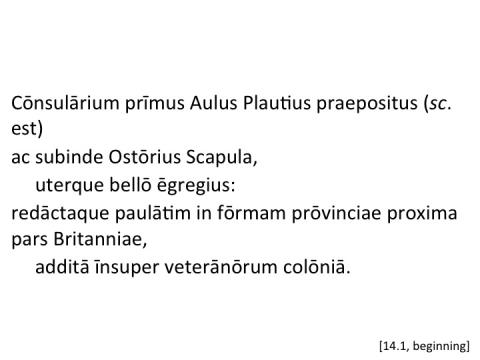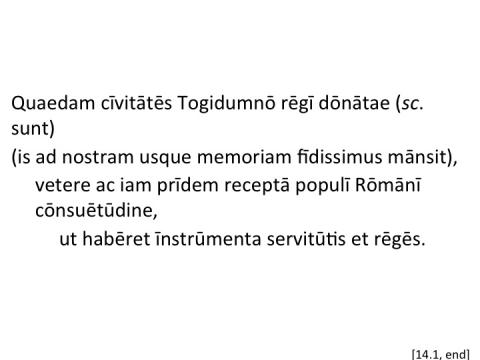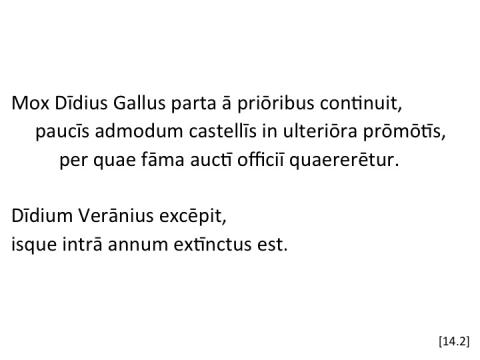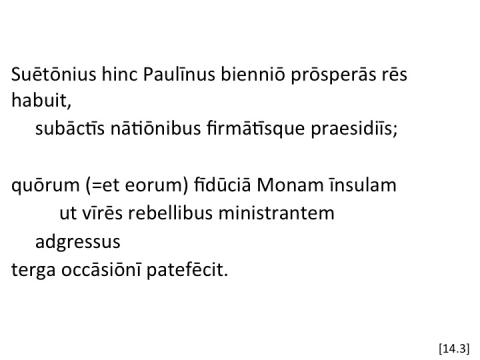Overview: Britain is organized into a province under Aulus Plautius and his immediate successors; Suetonius Paulinus, after a successful campaign of two years, invades the island of Mona; the Britons seize the opportunity for revolt. (Stuart); this chapter begins on f. 56r of the codex Aesinas.
14.1
cōnsulārium: the governors of Britain were regularly ex-consuls. (Stuart)
Aulus Plautius: the leader of the expedition of Claudius. (Stuart); his services in Britain were rewarded by an ovation. (Pearce); consul suffectus 29 CE, legatus of Dalmatia or Pannonia 41-43, of Britain 43-47. Of all the predecessors of Agricola, his successes seem to have been the most conspicuous, hence he is dismissed with a bare mention, his achievements being, moreover, attributed to Vespasian, a subordinate officer. (Gudeman)
subinde: "immediately thereafter." (Gudeman)
Ostōrius Scapula: P. Ostorius Scapula, governor of Britain, 47-51 CE, died in office; he established permanent camps as bulwarks of conquered territory and defeated and captured Caractacus, the last prince of Camulodunum. (Stuart); the memory of his western campaigns against the Silures is said to be preserved in the name of Oyster-hill, near Hereford. (Pearce)
proxima pars: the southern part of Britain; the Roman lines had been advanced to the Welsh frontier. (Stuart)
additā īnsuper ... colōniā: Camulodunum, the modern Colchester, in Essex, near the coast. The colony was established by Ostorius. Explain the ablative absolute on the analogy of expulsis insuper professoribus, chapter 2.2. (Stuart) [A&G 420.5]; fifty-one miles N.N.E. of London. (Gudeman)
Togidumnō: this spelling, which has stronger linguistic support, appears as a correction in the manuscript (see line 4 of the right-hand column); in the inscription mentioned below the beginning of the name is lost. (Damon) Cogidumnō: the name occurs elsewhere on an inscription found at Chichester in Sussex, which, therefore, was presumably the seat of his power. (Stuart); possibly identical with the (Co)gidubni r(egis) lega(ti) Aug(usti) in Brit(annia) in a celebrated inscription of the time of Claudius, found in Colchester. The title legatus Augusti may have been bestowed upon him as an exceptional honor for his steadfast loyalty to Rome. (Gudeman)
vetere ... cōnsuētūdine: "in accordance with a time-honored custom"; explained by the following ut-clause. (Stuart); ablative of manner. (Pearce) [A&G 412]
ut habēret, &c.: the subject is populus Romanus. The clause explains consuetudine; ... Translate "by an old and long-established custom of the Roman people, namely, to have," &c. (Pearce)
et rēgēs: in ironical contrast with servitutis. The Romans frequently contrived to obtain foothold in a country by attaching native rulers to their cause and by playing rival dynasties against each other. (Stuart); "even kings" ... . Examples of such royal allies in Roman history are Massinissa, Attalus, Eumenes, Prusias, Juba, Herod, Tigranes, Artavasdes, Cotys. (Gudeman)
14.2
Dīdius Gallus: A. Didius Gallus, governor of Moesia in 46, was dispatched to Britain to fill the vacancy caused by the death of Ostorius. Didius served 52-57 CE. Elsewhere Tacitus lays his inactivity to old age and satisfied ambition. (Stuart); born about 10 CE, curator aquarum 38-49. (Gudeman)
fāma auctī officiī: "the reputation of having extended the limits of his jurisdiction." (Stuart); i.e. by these actions he sought to gain the reputation of having added luster to his administration. (Gudeman) auctī officiī: i.e. of having done more than his duty demanded. (Pearce)
quaererētur: final subjunctive. (Stuart) [A&G 531.2]
Verānius: Q. Veranius Nepos, consul in 49 CE, legate of Britain 58-59. His activity was confined to depredations among the Silures. (Stuart); legatus propraetore of Lycia (under Claudius) ... . See Ann. 14.29. (Gudeman)
isque: "but he." The adversative use of -que is common in T., and not rare in previous writers. See e.g. ch. 17.2. (Gudeman)
14.3
Suētōnius ... Paulīnus: Agricola's chief. See ch. 5. (Stuart)
bienniō: properly ablative of "time within which;' then denoting by implication "time during which." (Pearce) [A&G 424a-b]
firmātīs ... praesidiīs: "establishing strong fortresses." (Stuart) firmātīs probably agrees in the "Ablative Absolute" with praesidiis, as we find the phrase firmare praesidium in other places in Tacitus. See note on 35.2 firmarent. (Pearce)
quōrum fīdūciā: "relying upon these two achievements," so per quae above includes two antecedents. (Gudeman); fiduciā is a causal ablative modifying adgressus. (Damon) [A&G 404]
Monam īnsulam: the modern Anglesey, subsequently invaded by Agricola (ch. 18.3). (Gudeman)
rebellibus: a poetical word, found in Vergil and Ovid, but rare in post- Augustan prose, except in Curtius and in Tacitus. (Gudeman)
terga occāsiōnī patefēcit: i.e. "he gave an opportunity to the enemy to attack his rear." The bold personification is apparently a Tacitean coinage. (Gudeman)




